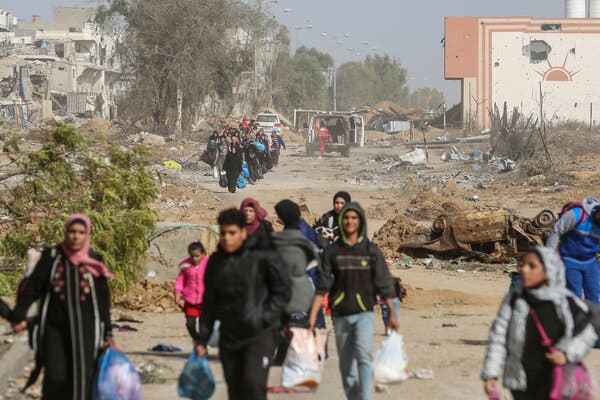For the majority of the yearlong conflict, Najia and Hammam Malaka have been stranded with their young children at opposite ends of the Gaza Strip. It has been devastating emotionally.
When everything was still normal, the new baby was supposed to arrive at the beginning of October. Hammam, Najia Malaka’s husband, had been counting down the days. However, they claimed that they were still waiting when the war broke out in Gaza.
Israel’s military ordered everyone in the north to leave as Israeli bombs rained down on Gaza City. A choice was made by the Malakas. He headed south with their two older children. She gave birth behind them, with their two young children.
That day, Oct. 13, she gave birth. Yet, he had proactively left. Except for a few early visits, they have not seen each other since.
Since Israel attacked the Gaza Strip in retaliation for the Hamas-led attack on Israel on Oct. 7, the war has decimated many families. Tens of thousands have been killed in fighting and bombing. Families have been dispersed throughout the strip as a result of the repeated evacuations of many of Gaza’s roughly two million residents. Moving around the tiny territory poses a significant risk, and death is possible.
The war is a wall for the Malakas. For nearly a year, they have been trapped less than 20 miles apart.
Mr. Malaka, 30, stated, “Every morning my heart aches.” Just missing them and wanting to hear their voices makes me feel so awful.
The Malakas gave separate interviews to The New York Times, one in person in the southern part of Gaza and the other by phone from the inaccessible north.
Israel was just beginning to deploy troops into northern Gaza on the day she gave birth. Her delivery was difficult. She claimed that an airstrike struck a nearby building while she was still breathing in the clinic while a nurse washed her blood.
While yelling for the new mothers to flee, the nurses and doctors fled. According to Ms. Malaka, she grabbed her infant and hid in a stairwell with the baby’s umbilical cord still inside. Dust and broken bricks had been scattered everywhere by the strike. She eventually made her way outside with the child she had given the name Mohammed and found a taxi to her mother’s house, where she was staying while her husband was away.
Mr. Malaka rushed back north when he heard that his son had been born, leaving Yamen, then 6, and Sandy, then 4, at his aunt’s house in southern Gaza. However, upon his arrival, he was unable to hold Mohammed, who was just one day old. He had behaved similarly with their other children as well. He was afraid he would drop or hurt them because they appeared to be so small and delicate.
He said he would return twice more in the coming weeks. Then, at the beginning of November, Israel’s military surrounded Gaza City in order to isolate Hamas fighters there. They also seized the main road that connected the north to the south of the Gaza Strip, separating the two halves.
A trip of less than an hour was quickly becoming as feasible as driving to Mars for many families with distant relatives.
At predetermined times of the day, Israel’s military permitted civilians in the north to evacuate south via “humanitarian corridors.” However, those who did flee south, primarily on foot, described a harrowing journey through Israeli checkpoints and down a damaged road littered with what they claimed to be bodies and debris.



